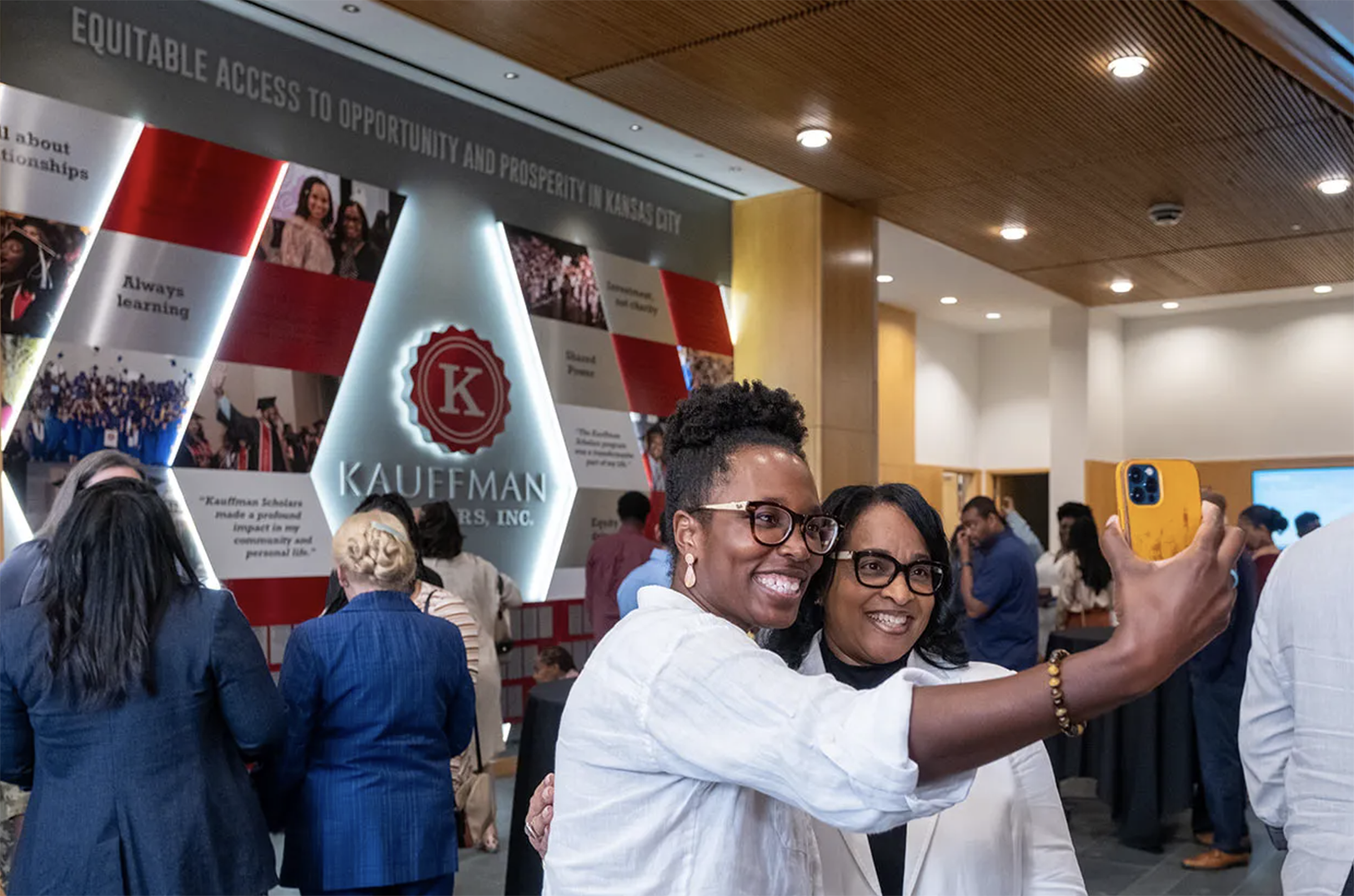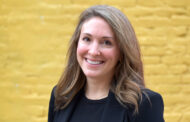Editor’s note: The Ewing Marion Kauffman Foundation is a financial supporter of Startland News.
The legacy of Kauffman Scholars — an initiative of the Ewing Marion Kauffman Foundation that sunset earlier in 2023 after 20 years — can be seen in the decades of students impacted and the passion fueling the effort from within, according to a new research study.
“This program is near and dear to my heart because it is about inspiring young people and giving them opportunities for access,” said Dr. DeAngela Burns-Wallace, president and CEO of the Kauffman Foundation.
Established in 2003 by Kauffman Foundation, Kauffman Scholars, Inc. (KSI) provided college scholarships, academic tutoring, and mentoring to students starting from seventh grade.
Click here to read more about the history of Kauffman Scholars.
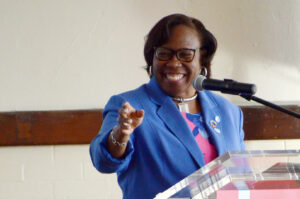
Dr. DeAngela Burns-Wallace, Ewing Marion Kauffman Foundation, speaks during ESO Day at Plexpod Westport at Park 39 amid Global Entrepreneurship Week-Kansas City; photo by Tommy Felts, Startland News
A study conducted by NORC researchers on behalf of Kauffman sought to quantify the program’s impact — propelling minority and low-income students towards success in their careers — by looking at participating students’ post secondary achievements.
Click here to check out key findings from the research.
Burns-Wallace began her role with Kauffman in August, dovetailing with the longtime program’s sunsetting. Reflecting on its legacy, she recalls her personal connection with Kauffman Scholars graduates from her time in higher education at the University of Missouri.
“The beauty of the program was the richness of those that worked for Kauffman Scholars,” said Burns-Wallace. “The coaches and the leadership of the program all were very reflective of the students that they were serving.”
She noted that many KSI coaches shared similar high school backgrounds as their students, lived in the same neighborhoods, and belonged to Black or Brown communities, creating a meaningful connection with the Scholars and their families.
“They knew that they were seen and that the people that were supporting them through this program had an understanding and similar lived experiences,” said Burns-Wallace.
Click here to read about the dedication of Kauffman Scholars’ legacy wall this fall — on Ewing Kauffman’s Sept. 21 birthday.
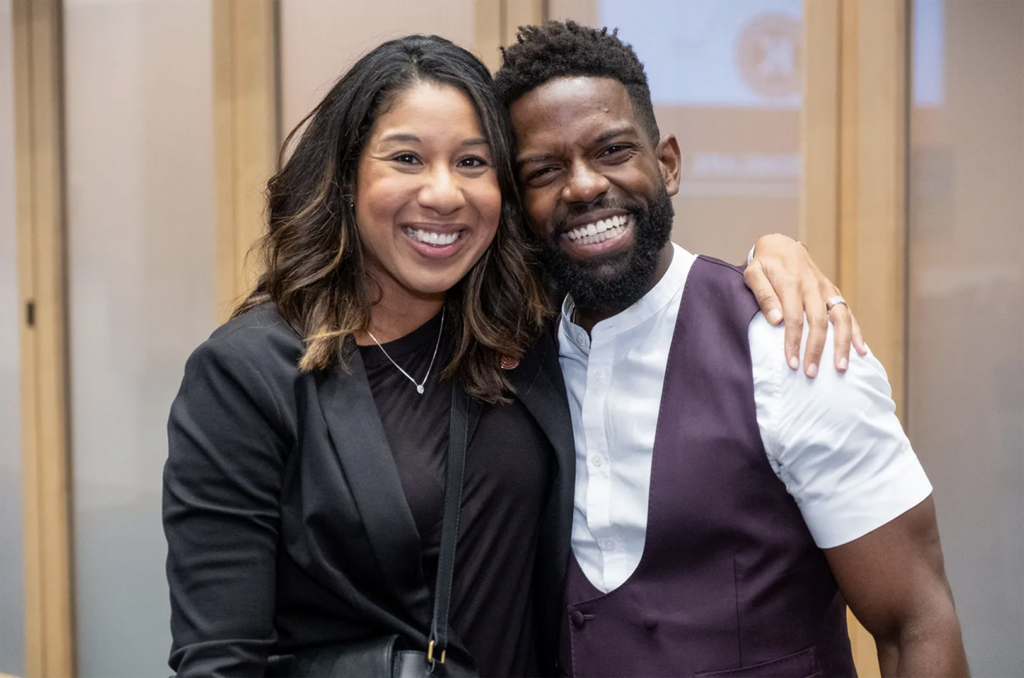
Kauffman Scholars alumni join in celebration at the KSI Legacy Wall during a Sept. 21 ribbon-cutting event; photo courtesy of the Ewing Marion Kauffman Foundation
KSI’s success by the numbers
Debbie Kim and Carol McElvain, researchers from NORC at the University of Chicago, used a variety of methods (surveys, interviews with KSI, and KSI staff data) to find out how well the program has helped Scholars in terms of their satisfaction and if they’ve achieved their goals over time.
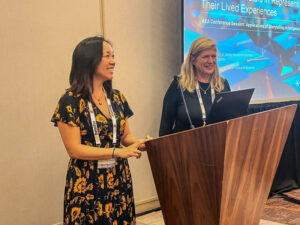
Debbie Kim and Carol McElvain how NORC used storytelling as a culturally responsive method to understand what enabled scholars in the Kauffman Scholars Incorporated scholarship program to realize program goals and create a ripple effect that extended to their larger community, and factors that impeded those efforts; photo courtesy of NORC at the University of Chicago
“The Scholars are open to talking with us; a lot of them are in Kansas City, and a lot of them are very committed to the Kauffman Foundation, so we can really dig in deep,” said Kim.
The findings show that 90 percent of Scholars came from historically marginalized racial and ethnic groups, with 51 percent completing the initial program, and 33 percent achieving Alumni status.
With the survey, 75 percent of the Scholar respondents reported they were very satisfied or extremely satisfied with the program.
“The thing that stood out to me from the data was the stories about how meaningful this program was, whether they were staff members, or the scholars themselves,” said researcher McElvain.
Listening to impactful stories of students achieving financial freedom and overcoming student debt, along with staff providing support through challenges such as housing and food insecurity during the pandemic, showed the program’s profound personal impact on them, she said.
“I was really struck by the level of commitment of the staff,” added Kim. “I would speak with someone who was there 20 years ago, and they could rattle off the names of all the Scholars they worked with and they’re still in touch with them.”
The Kauffman Scholars program broadened its definition of post-secondary success to include various paths, such as completing associate’s degrees, certificates, full-time enrollment in the U.S. military or police academy, or pursuing specific goals for a stable financial pathway.
“It helped to meet them where they are,” said Kim about the shift. “It really started to change the ways that the staff interacted with the scholars, and the kinds of programs that they offered as well.”
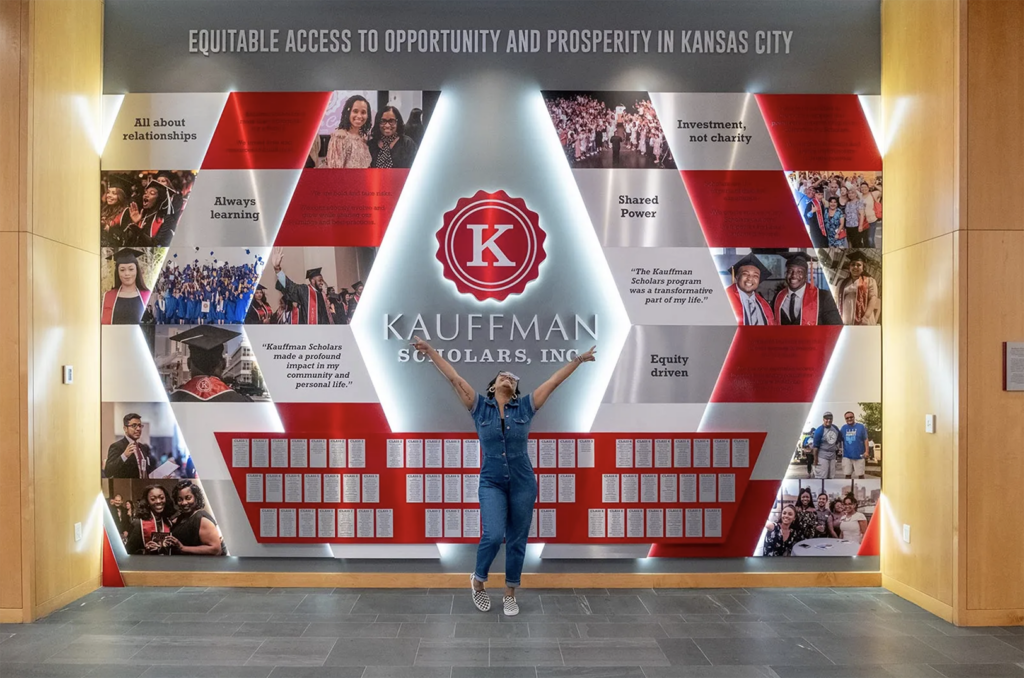
A Kauffman Scholars alum poses in front of the KSI Legacy Wall at the ribbon-cutting event on Sept. 21; photo courtesy of the Ewing Marion Kauffman Foundation
Lifelong impact
Maya Tilmon, a Class Three Kauffman Scholar, and Ezra Woods, a Class Eight Kauffman Scholar feel that the program significantly impacted their career paths for the better.
Tilmon holds a bachelor’s degree in mass communications and a master’s degree in higher education, both from Kansas State University. Having experience as a retention specialist, she currently works at a nonprofit linked to University Academy, a college prep charter school in Kansas City.
“I think my whole career path has all these little Kauffman droplets that keep coming up,” said Tilmon. “Now that we are adults in society and Kansas City, we’re in the same circles as people that we were either in the program with, or were coaches.”
Woods attended Southeast Missouri State University and completed his final year at the University of Missouri-Kansas City. His journey led him to Signal Theory, a Kansas marketing agency, where he works as a brand strategy strategist.
Woods believes the financial literacy skills he learned from Kauffman Scholars made it much easier for him to pursue a career, he said.
“Going into those career development workshops and being taught things like how to negotiate at 12 years old, that helped me with my very first job,” Woods added.
Both former students, however, said the most valuable aspect of the program was the close support and connection that the coaches gave to Scholars.
“With your coaches, they’re asking more personal questions just to make sure that you’re staying on track in this new world,” said Woods. “You get to know each other on a very different level.”



